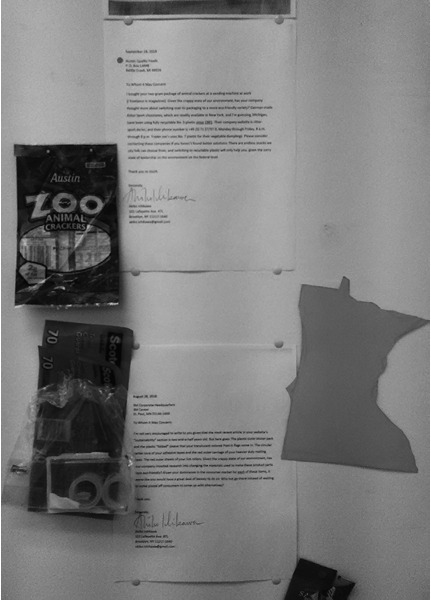
SOMETIMES THEY LISTEN
first performed on November 3, 2018
mhProjectNyc, New York, NY
performed once in 2018
AKIKO ICHIKAWA
Brooklyn, NY
SOMETIMES THEY LISTEN
AKIKO ICHIKAWA
If the fourth wall is a performer’s interaction with viewers, what would it mean to break the first wall, say, the sources of the “stuff” in our contemporary lives? From July 2018, I collected all of the unrecyclable, uncompostable material (usually plastic), that enveloped the edible, household, art, and other products I bought to maintain my life and art practice. One part pop-self-portraiture, the work borrows Andy Warhol’s idea of becoming the machine that makes art. I’ve been writing to all the manufacturers/distributors (some outside the U.S.) of these goods, asking them to replace their current packaging, performatively pushing a polemic via the recently-lost craft of mailed correspondence while providing a social service. The UN released a report in late 2018 that describes the likelihood of a climate genocide scenario in 12 years if the major world societies continue on their current course. In “Sometimes They Listen,” I use art to shed journalistic light, as in the work of Hans Haacke, but instead of New York City’s real estate holdings, it’s the presence of U.S. cities and towns most Americans have never heard of, or which states produce this kind of trash. By incorporating the discards from my own life, I also underscore the feminine realm of the personal, aligning my work with the anti-capitalist threads in recent US feminist art history, particularly in the oeuvres of Mierle Laderman Ukeles and Barbara Kruger. Using detritus and direct action as material, I foster a criticality while operating in a system that everyone acknowledges is wasteful but few want to address, most significantly in a Western metropole where the tumbleweeds of single-use plastic bags are a daily sight.
On November 3, I opened and read the ten mailed corporate responses to an audience in the middle of an installation of my letters and trash. Going in chronological order of receipt, I read then sorted the envelopes into “satisfactory/good” and “bad/BS” piles, depending on what each correspondence ultimately communicated. The bigger pile formed the “bad” pile, while the “good” one represented companies that dealt seriously with what I asked without giving me the runaround. That is, what I and my audience collectively felt from their writing, which included a lot of corporate-speak, that KitchenAid (Michigan), McDonald’s (Illinois), Earl of Sandwich (Florida), and Glico (Japan) were striving to make, truly understood and appreciated the tailor-made suggestions and recommendations I sent each.